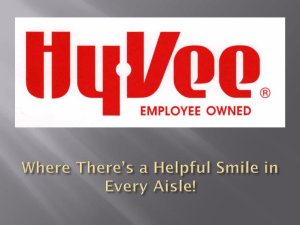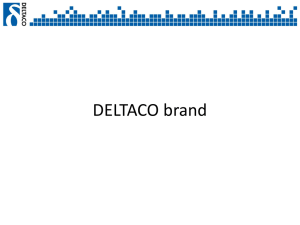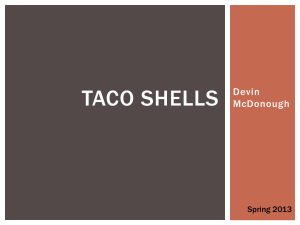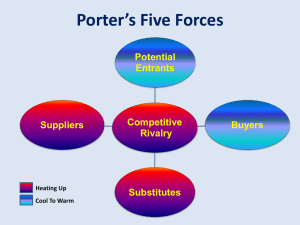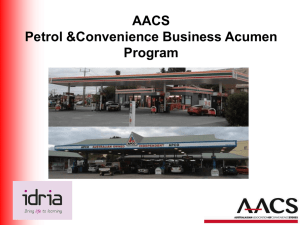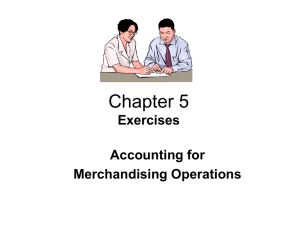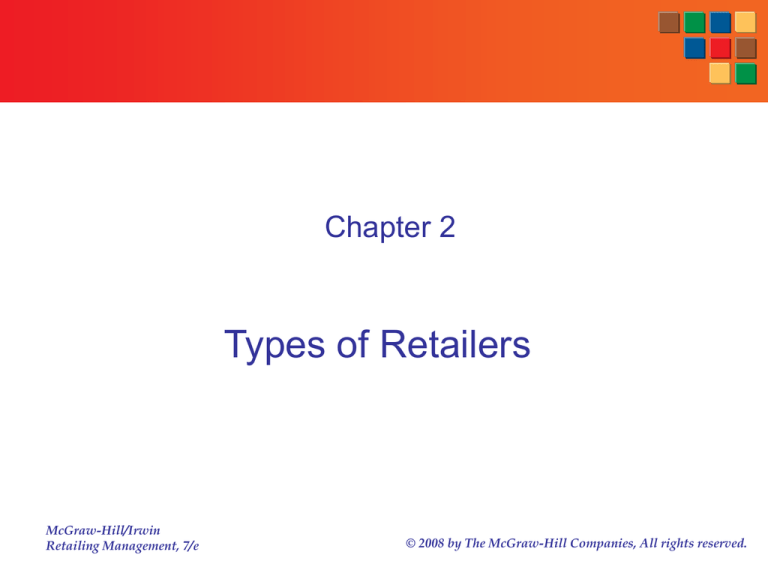
Chapter 2
Types of Retailers
McGraw-Hill/Irwin
Retailing Management, 7/e
© 2008 by The McGraw-Hill Companies, All rights reserved.
Questions
■ What trends shape today’s retailers?
■ What are the different types of retailers?
■ How do retailers differ in terms of how they meet the
needs of their customers?
■ How do service retailers differ from merchandise
retailers?
■ What are the types of ownership for retail firms?
2-2
General Trends in Retailing
■
■
■
■
■
New Types of Retailers
Increased Concentration
Globalization
Growth In Services Retailer
Demise of Pure Electronic Retailers (Webvan,
eToys, etc)
■ Growth in Use of Multi-Channel Retailing by
Traditional Retailers
■ Increase Use of Technology to Reduce Cost;
Increase Value Delivered
2-3
Types of Retailers
■ Retailers Use Different Retail
Mixes
-merchandise: variety (breadth) /
assortment (depth)
-services
-store design, visual merchandising
-location
-pricing
■ Infinite Variations
■ Some combination of retail mixes
satisfy the needs of significant
segments and persist over time.
2-4
New Types of Retailers
■ Category
Specialists
-PETsMART
-Bed, Bath and
Beyond
■ CarMax and
Auto Nation
■ Netflix, eBay,
Priceline,
Travelocity
2-5
Bag Borrow or Steal
2-6
Different Retail Mixes
■
■
■
■
■
■
Merchandise: variety (breadth)
Assortment (depth)
Services
Store design, visual merchandising
Location
Pricing
2-7
Types of Merchandise Retailers
Food Retailers
Mom and Pop Stores
Convenience Stores
Supermarkets
Supercenters
General Merchandise Retailers
Department Stores
Specialty Stores
Discount Stores
Category Specialists
Off-Price Retailers
Warehouse Clubs
Value Retailers
2-8
NAICS Codes for Retailers
2-9
Merchandise Offering
Variety (breadth of merchandise): wide vs. narrow
- The number of merchandise categories
Assortment (depth of merchandise): deep vs. shallow
-the number of items in a category (SKUs)
2-10
Variety and Assortment of Kayaks in
Different Retail Outlets
2-11
Services offered
Retailers differ in the services
they offer customers
EMS offers assistance in
selecting the appropriate kayak
and repairing them
VS
Outdoorplay.com and
Wal-Mart: doesn’t provide any
services
2-12
Illustration of Variety and Assortment
Lady Foot Locker
Sports Authority
Active
SKUs: 44
N/A
Classics
SKUs: 44
N/A
Converse
SKUs: 25
N/A
Elite Running
SKUs: 22
N/A
Fitness
N/A
SKUs: 1
Running
SKUs: 44
SKUs: 39
Trail Running
N/A
SKUs: 7
Training
SKUs: 22
SKUs: 2
Walking
SKUs: 11
SKUs: 12
2-13
Variety and Assortment of Coffee Makers
Linens N’
Things
Makers Less Than
8 Cups
Makers Greater Than
10 Cups
Specialty Makers
Brands
Black and Decker
Cuisinart, Mr. Coffee, Black and
Decker, Faberware, Braun,
Hamilton Beach, Krups, Sunbeam
Braun, Keurig,
Breville, Krups
# SKUs
2 SKUs
19 SKUs
7 SKUs
Price
Range
$19.99-19.99
$29.99-199.99
$59.99-249.99
$19.99
$83.67
$157.13
Brands
Black and Decker, Mr. Coffee
Mr. Coffee, Black and Decker,
Hamilton Beach, Delonghi,
Kitchen Aid, Bunn, Chefmate
Keurig, Mr. Coffee,
Delonghi, Philips
# SKUs
4 SKUs
16 SKUs
5 SKUs
Price
Range
$10.48-$29.99
$9.49-$119
$29.99-99.99
$22.61
$51.83
$74.99
Average
Price
Target
Average
Price
2-14
Variety and Assortment of Bicycle
Mountain
Road
Hybrid/
Cross
BMX
Comfort/
Cruisers
Training/
Child
Wal-Mart
Pacific,
Dynacraft,
Huffy, Kent
International,
Pacific Cycle
Pacific, Kent
International,
Huffy
_______
Currie
Tech.,
Dumar,
Dynacraft,
Huffy, Kent
Internation
al, Pacific
Cycle
_______
Dumar,
Dynacraft, Huffy,
Kent
International,
MGA, Pacific
Cycle, Radio
Flyer
SKUs
23 SKUs
15 SKUs
_____
22 SKUs
_____
53 SKUs
Price
$40-$250
$130-$1500
_____
$40-$250
_____
$130-$1500
Gator Cycle
Trek, Gary
Fisher
Trek, LeMond
Trek
Trek, Gary
Fisher
Trek
SKUs
23 SKUs
18 SKUs
12 SKUs
4 SKUs
5 SKUs
Price
$290-$5,700
$770-$5,800
$360-$1300
$360-$590
$160-$270
2-15
In-Store Digital Camera Comparison Shopping
Best Buy vs. Wal-Mart
Standard
(Snapshooter)
Sleek & Slim
(Trendsetter)
Advanced
(Serious Amateur)
Best Buy
Canon, Kodak, HP,
Nikon, Olympus,
Sony
Canon, Casio, Fuji,
HP, Nikon, Olympus,
Sony
Canon, Kodak,
Panasonic, Sony
SKUs
10
11
14
Price
Range
$99.99 - $199.99
$1469.99 - $349.99
$179.99 - $549.99
Wal-Mart
Canon, Fuji, Kodak,
Samsung, Pentax,
Polaroid
Canon, Fuji, Sanyo,
Samsung, Kodak,
Olympus, Norcent,
Pentax
Canon, Fuji, Kodak,
Panasonic, Sony
SKUs
10
20
7
Price
Range
$89.98 - $299.96
$79.88 - $308.77
$198.32 - $549.84
2-16
SKUs for Digital Cameras
Wal-Mart
Best Buy
Megapixel
s
Model
Price
Model
Snapshooter
8
Fujifilm FinePix Z10
7
Kodak C813
Kodak Easyshare
C613
Price
Standard
Canon Powershot
SX100
Fujifilm FinePix Z5
Megapixel
s
6
8
6
299.96
Canon Powershot
A560
7
149.99
139.84
HP M53BNDL
6
179.99
HP Photosmart
M547
6
99.99
119.77
Kodak Easyshare
C613
7
99.99
89.88
Kodak Easyshare
C613P
6
99.99
7
129.99
162
Kodak Easyshare
V1003
10
149.34
Kodak Easyshare
M753
Pentax Optio M30
7
169.84
Nikon CoolPix L11
6
109.99
Polaroid i733LP
7
99.88
Olympus FE-340
8
199.99
99.77
Sony Cybershot
DSC-S700
7
149.99
129.77
Sony Cybershot
DSC-W55
7
179.992-17
Samsung S730
Samsung S850
7
8
Prices and the cost of offering breath and
depth of merchandise and services
Stocking a deep and broad assortment (like EMS)
is costly for retailers.
Many SKUs
Because the retailer must have backup stock for each SKU
in addition to holding the inventory
Inventory Investment Cost
2-18
Sales and growth rate for retail sectors
2-19
Food Retailers
Channel preference for food shopping
channel where grocery purchasers do most
of their food shopping
■ Supermarkets
■ Supercenters
■ Warehouse
Clubs
■ Convenience
Stores
2-20
Characteristics of Food Retailers
2-21
Types of Food Retailers
Conventional
Supermarket
Limited
Assortment
Supermarket
Supercenter
Warehouse
Club
Convenience
Store
Percentage Food
70-80
80-90
30-40
60
90
Size (000 sq ft)
20-30
7-10
150-220
100-150
2-3
SKUs (000)
20-40
1-1.5
100-150
20
2-3
Variety
average
narrow
broad
broad
narrow
Assortment
average
shallow
deep
shallow
shallow
Ambiance
pleasant
minimal
average
minimal
average
Service
modest
limited
limited
limited
limited
# of checkout lines
6-10
2-4
20-30
10-15
1-2
Prices
average
lowest
low
low
high
Gross Margin %
20-22
10-12
15-18
12-15
25-30
2-22
Supermarkets
■ Conventional supermarkets
30,000 SKU
■ Limited assortment supermarkets
(extreme value food retailers)
2000 SKU
Offer one or two brands and sizes
Designed to maximize efficiency and
reduce costs
Offer merchandise at 40-60% lower
prices than conventional supermarkets
Save-A-Lot, ALDI (German’s Wal-Mart)
2-23
ALDI: German’s Wal-Mart
ALDI provides quality merchandise at low prices by reducing its
assortment in order to control store operating expenses
2-24
ALDI’s Strategy
4,100 stores in Germany and 6,600 worldwide, including 800 stores in
26 US states
Cheap..
Only two brands of toilet paper and one brand of pickles
STRATEGY:
Stores sell less products
ALDI exclusive label
High quality of products at cheaper prices
HOW?
Strong control over quality and price
Simplify shipping and handling
Reduce labor costs by keeping limited store staff, etc.
2-25
Save-A-Lot
Save-A-Lot’s limited assortment format
means that stores carry the most
frequently purchased grocery items in
the most popular size and variety
The company carries high quality
exclusive brands – many produced by
the same manufacturers of leading
name brands – and an assortment of
nationally branded items.
Used by permission of Save-A-Lot
This allows Save-A-Lot to offer savings
of up to 40% compared to
conventional grocery stores – without
asking shoppers to sacrifice quality.
2-26
Trends in Supermarket Retailing
Competition from Discount Stores
Efficient
Distribution
Lower Costs
Lower Prices
Changing Consumption Patterns
Time Pressure
Eating Out More
Meal Solutions
2-27
Conventional Supermarket Survival Pack
■ Emphasize Fresh Perishables
Wegmans
■ Target health conscious and
ethnic consumers
■ Provide a better in-store
experience
■ Offer more private label brands
Chef-crafted meals on the go at EatZi’s
2-28
Supercenters and Warehouse Clubs
Supercenters
■ The fastest growing retail
category
■ Large stores (150,000 –
220,000 square feet) that
combine a supermarket
with a full-line discount
store
■ One-stop shopping
experience
Warehouse Clubs
■ Offer a limited and irregular
assortment of food and
general merchandise with
little service at low prices
■ Use low-locations,
inexpensive store design,
little customer service
■ Low inventory holding
costs by carrying a limited
assortment of fast selling
items
2-29
Convenience Store
■
■
■
■
■
■
Tailors assortments to local market
Makes more convenient to shop
Offers fresh, healthy food
Fast, casual restaurants
Financial services available
Opening smaller stores closer to consumers (like
airports)
2-30
Types of General Merchandise Retailers
■
■
■
■
■
■
■
■
Department Stores
Specialty Stores
Category Specialists
Home Improvement Centers
Discount Stores
Drugstores
Off-Price retailers
Extreme Value Retailers
2-31
Characteristics of
General Merchandise Retailers
2-32
Issues in Department Store Retailing
■ Competition
-Discount Stores on Price
-Specialty Stores on Service, Depth of
Assortment
■ Lower Cost by Reducing Services (?)
-Centralized Cash Wraps
■ More Sales (?)
-Customers Wait for Sale
■ Focus on Apparel and Soft Home
■ Develop Private Labels and
Exclusive Brands
2-33
Three Tiers of Department Stores
■ First Tier: Upscale, high fashion chains
with exclusive designer merchandise and
excellent customer service
Nordstrom, Neiman Marcus, Saks
■ Second Tier: Retailers sell more modestly
priced merchandise with less customer
service
Macy’s
■ Third Tier: Value oriented caters to more
price conscious customer
JCPenney, Sears, Kohl’s
Rob Melnychuk/Getty Images
2-34
Department Stores:
What To Do With an Eroding Market
To deal with an eroding market
Department stores are:
■ attempting to increase the amount
of exclusive merchandise they sell
Royalty-Free/CORBIS
■ undertaking marketing campaigns
to develop strong images for their
stores and brands
■ building better relationships with
their key customers
2-35
Issues in Discount Store Retailing
■ Only Big Left
Wal-Mart, Target
■ Wal-Mart’s Dominance
■ Differentiate Strategy
Wal-Mart = Low Price and Good value
Target = More Fashionable Apparel
McGraw-Hill Companies,
Inc./Gary He,
photographer
■ Competition from Category Specialists
Toys-R-Us, Circuit City, Sports Authority
2-36
Issues in Specialty Store Retailing
■ Mall-Based Apparel Retailers
■ Decline in Mall Shopping and
Apparel Sales
-Lack of New Fashions
-Less Interest in Fashion
-Increased Price Consciousness
■ Lifestyle Formats –
Abercrombie and Fitch
Hot Topics
McGraw-Hill Companies, Inc./Andrew Resek, Photographer
2-37
Specialty Store Retailers
McGraw-Hill Companies, Inc./Andrew Resek, Photographer
2-38
Issues in Drug Store Retailing
■ Consolidation – Walgreens,
CVS, Rite-Aid
■ Competition from Supermarkets,
discount Stores and mail-in
orders
■ Evolution to a New Format
-Stand Alone Sites with Drive Thru
Windows
-offering more frequent purchase food
items
■ Improved systems provide
personalized service in the
pharmacy
2-39
Category Specialists
■ Deep and Narrow
Assortments
Destination Stores
■ Category killers
■ Low Price and Service
■ Wholesaling to
Business Customers
and Retailing to
Consumers
■ Incredible Growth
Bass Pro Shops
2-40
Category Specialists
Sephora,
France’s leading perfume/cosmetic chain
LVMH’s division
2-41
Category Specialists:
Home Improvement Centers
Home Depot and Lowes act as both:
Retailer
Consumer
and
Wholesaler
Business
2-42
Home Improvement Centers
■ Displayed in a warehouse
atmosphere
■ Customer Service: How to
select and how to use
merchandise
■ Competition focuses on price,
effort to differentiate and
services provided
Ryan McVay/Getty Images
2-43
Issues in Extreme Value Retailing
■
■
■
■
■
Focuses on Lower Income Consumers
Names mostly imply good value not $1 price points
Low Cost Location
Limited Services
One of the Fastest Growing Retail Segments
Dollar Tree
Family Dollar
Dollar General
99 Cents Only Store
2-44
Off-Price Retailers
■ Close-out retailers
■ Offer an inconsistent assortment of brand name
merchandise at low prices
TJX companies (T.J. Maxx, Marshalls. HomeGoods)
Ross Stores, Burlington Coat factory, Big Lots, Tuesday
Morning
2-45
Types of Non-store Retailers
2-46
Electronic Retailing
■ Many retailers operate from virtual storefronts on the
World Wide Web, usually maintaining little or no
inventory, ordering directly from vendors to fill customer
orders
■ History of frenzied investments and false predictions of
retail dominance
■ Primarily used by traditional retailers to compliment store
and catalog offerings
■ Exclusive e-tailers target small and dispersed niche
markets
2-47
What are Amazon and eBay?
■ Amazon.com – Merchandise to consumers.
Provides website development and fulfillment
services to other retailers
■ eBay – Acts as a mall or other shopping center
providing a “place” for buyers and sellers to meet
2-48
Don Farrall/Getty Images
Issues in Catalog Retailing
■
■
■
■
■
■
■
Low Start Up Cost
Evolution of Multi-Channel Offering
Hard to compete with large well established firms
Increasing Mail Costs
Clutter from other Catalogs
General merchandise catalogs like JC Penney
Specialty Catalogs like Victoria Secret
2-49
Issues in Direct Selling
■ Completely bypasses retailers and wholesalers
Manufacturers set up their own channels to sell their products
directly to consumers
■ Party plan system: merchandise is demonstrated in a
party atmosphere
■ Multi-level network: Master distributors sell to distributors
who sell merchandise
■ Pyramid schemes: Firm sells to other distributors and
little if any merchandise goes to end users
2-50
Issues in Television Home Shopping
■ Consumers watch cable stations, infomercials or direct
response ads
■ Few consumers watch regularly
■ Most purchases made by small proportion of viewers
■ Customers can’t examine merchandise
■ Customers must wait for merchandise to come on
■ Sells predominately jewelry, apparel, cosmetics,
kitchenware, and exercise equipment
2-51
Issues in Vending Machine Retailing
■ Automatic Merchandising
About $25 billion worth of convenience goods are sold to Americans through
4.7 million vending machines
■ Sales growth has been declining due to higher prices and healthier
eating habits
■ New technology may help sales growth
■ Trend of placing machines in captive consumer locations
2-52
Services vs. Merchandise Retailers
■
Intangibility
Problems in Evaluating Service Quality
Performance of Service Provider
■
Simultaneous Production and Delivery
Importance of Service Provider
■
Perishability
No Inventory, Must Fill Capacity
■
Inconsistency of the Offering
Importance of HR Management
2-53
Examples of Service Retailers
Type of Service
Service Retail Firms
Airlines
American, Delta, British Airways, Singapore Airways
Automobile maint/repair
Jiffy Lube, Midas, AAMCO
Automobile rental
Hertz, Avis, Budget, Alamo
Banks
Citibank, NCNB, Bank of America
Child care centers
Kindercare, Gymboree
Credit cards
American Express, VISA, Mastercard
Education
University of Florida, Babson College
Entertainment parks
Disney, Universal Studios, Six Flags
Express package delivery Federal Express, UPS, US Postal Service
Financial services
Merrill Lynch, Dean Witter
Fitness
Jazzercise, Bally’s, Gold’s Gym
Health Care
Humana, HCA
Home maintenance
Chemlawn, MiniMaid, Roto-Rooter
2-54
Examples of Service Retailers
Type of Service
Service Retail Firms
Hotels and motels
Hyatt, Sheraton, Marriott, Days Inn
Income tax preparation
H & R Block
Insurance
Allstate, State Farm
Internet access/Elec info.
American On-Line, CompuServe
Movie theaters
AMC, Loews/Sony, Universal
Real estate
Century 21, Coldwell Banker
Restaurants
TGI Friday’s, Wendy’s, Pizza Hut
Truck rentals
U-Haul, Ryder
Weight loss
Weight Watchers, Jenny Craig
Video rental
Blockbuster, Hollywood Video
Vision centers
Lenscrafter, Pearle
2-55
Merchandise/Service Continuum
2-56
Types of Retail Ownership
■ Independent, Single Store
Establishments
Wholesale-sponsored
voluntary group
■ Corporate Retail Chains
■ Franchises
(c) Brand X Pictures/PunchStock
2-57
Retailers Using Franchise Business Model
2-58
Franchising
■ 30 – 40% of US Retail Sales
■ Franchisee Pays Fixed Fee
Plus % of Sales
■ Franchisee Implements
Program
■ Why is this Ownership
Format Efficient?
The McGraw-Hill Companies, Inc./Jill Braaten, photographer
2-59
Reasons for Franchising Growth
Technological advances
Profitable utilization of capital resources
Attainment of the “American Dream”
Demographic expansion
Product/service consistency
2-60
Reasons for Franchising Failure
Inept management
Fraudulent activities
Market saturation
2-61
Franchisor Positions in the Marketing Channel
Manufacturer - retailer
Manufacturer - wholesaler
Wholesaler - retailer
Service sponsor - retailer
2-62
Franchisor Benefits
Continuous market
Market information
Money
Royalty fees
Sales of products
Rental and lease fees
License fees
Management fees
2-63
Franchisee Benefits
Initial Services
Market survey and site selection, facility design and
layout, lease negotiation advice, financing advice,
operating manuals, management training programs,
and employee training.
Continuous Services
Field supervision, merchandising and promotional
materials, management and employee retraining,
quality inspection, national advertising, centralized
purchasing, market data and guidance, auditing and
record keeping, management reports, and group
insurance plans.
2-64
Franchisor Advantages/Disadvantages
Advantages
Rapid expansion, highly motivated franchisees do a
good job, additional profits by selling franchisees
products and services.
Disadvantages
Company-owned units may be more profitable, less
control then independent retailers over advertising,
pricing, personnel practices, etc.
2-65
Franchisee Advantages/Disadvantages
Advantages
Established/proven product/service, business and
technical assistance, and reduction in risk.
Disadvantages
Loss of control since only semi-independent,
franchisee outlets may compete with corporateowned outlets, and high royalties, fees, costs on
equipment, supplies, merchandise, rental/lease rates
and mandatory participation in promotional and
support services.
2-66
Franchising Trends for the New Millennium
Sustained growth
Enduring plus un-imagined applications
International expansion
Increasing tensions
Greater emphasis on financial returns
2-67





